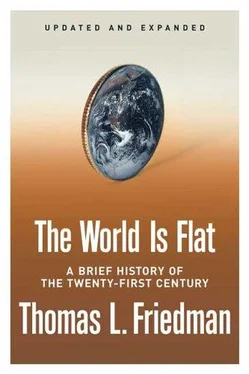Another of these intangible things is how much your culture prizes education. India and China both have a long tradition of parents telling their children that the greatest thing they can be in life is an engineer or a doctor. But building the schools to make that happen in Mexico simply has not been done. India and China each have more than fifty thousand students studying in the United States today. They come from about twelve time zones away. Mexico, which is smaller but right next door, has only about ten thousand. Mexico is also right next door to the world's biggest economy, which speaks English. But Mexico has not launched any crash program in English education or invested in scholarships to send large numbers of Mexican students to the United States to study. There is a “disconnect,” said President Zedillo, among Mexico's political establishment, the challenges of globalization, and the degree to which anyone is educating and harnessing the Mexican public to this task. You would have to look a long time for a graduate science or math program at an American university that is dominated by Mexican students the way most are dominated by Chinese and Indian students.
The government of President Vicente Fox had set out five areas for reform retail to make the Mexican economy more productive and flexible: labor market reform to make it easier to hire and fire workers, judicial reform to make Mexico's courts less corrupt and capricious, electoral and constitutional reform to rationalize politics, tax collection reform to increase the country's dismal tax harvest, and energy reform to open the energy and electricity markets to foreign investors so that Mexico, a major oil producer, gets out of the crazy bind of importing some natural gas and gasoline from America. But almost all of these initiatives got stalled in the Mexican parliament.
It would be easy to conclude from just looking at Mexico and China that democracy may be a hindrance to reform retail. I think it is premature to conclude that. I think the real issue is leadership. There are democracies that are blessed with leaders who are able to make the sale and get their people focused on reform retail-Margaret Thatcher in England comes to mind-and there are democracies that drift for a long time without biting the bullet-modern Germany, for example. There are autocracies that really get focused-modern China-and there are others that just drift aimlessly, unwilling really to summon their people because the leaders are so illegitimate they are afraid of inflicting any pain-Zimbabwe.
Mexico and Latin America generally have “fantastic potential,” says President Zedillo. “Latin America was ahead of everyone thirty years ago, but for twenty-five years we have been basically stagnant and the others are moving closer and well ahead. Our political systems are not capable of processing and adopting and executing those [reform retail] ideas. We are still discussing prehistory. Things that are taken for granted everywhere we are still discussing as if we are living in the 1960s. To this day you cannot speak openly about a market economy in Latin America.” China is moving every month, added Zedillo, “and we are taking years and years to decide on elementary reforms whose needs should be strikingly urgent for any human being. We are not competitive because we don't have infrastructure; you need people to pay taxes. How many new highways have been built connecting Mexico with the U.S. since NAFTA? [Virtually none.] Many people who would benefit from government expenditure don't pay taxes. The only way for government to serve is get people to pay higher taxes, [but] then the populism comes up and kills it.”
A Mexican newspaper recently ran a story about how the Converse shoe company was making tennis shoes in China using Mexican glue. “The whole article was about why are we giving them our glue,” said Zedillo, “when the right attitude would be how much more glue can we sell them? We still need to break some mental barriers.”
It is not that Mexico has failed to modernize its export industries. It is losing ground to China primarily because China has changed even faster and more broadly, particularly in educating knowledge workers. As business consultant Daniel H. Rosen pointed out in an essay in The International Economy journal (Spring 2003), Mexico and China both saw their share of global exports grow in many of the same areas during the booming 1990s-from auto parts to electronics to toys and sporting goods-but China's share was growing faster. This was not just because of what China was doing right but because of what Mexico was doing wrong, which was not steadily honing its competitiveness with micro-reforms. What Mexico succeeded in doing was creating islands of competitiveness, like Monterrey, where it got things right and could take advantage of proximity to the United States, but the Mexican government never had a strategy for melting those islands into the rest of the country. This helps explain why from 1996 to 2002, Mexico's ranking in the Global Competitiveness Report actually fell while China's rose. And this was not just about cheap wages, said Rosen. It was about China's advantages in education, privatization, infrastructure, quality control, mid-level management, and the introduction of new technology.
“So China is eating Mexico's lunch,” concluded Rosen, “but more due to the Mexican inability to capitalize on successes and induce broader reform than to China's lower wage workers per se.” In other words, it's reform retail, stupid. According to the Doing Business in 200S report, it takes an average of fifty-eight days to start a business in Mexico, compared with eight in Singapore and nine in Turkey. It takes seventy-four days to register a property in Mexico, but only twelve in the United States. Mexico's corporate income tax rate of 34 percent is twice as high as China's.
The McKinsey Quarterly report “Beyond Cheap Labor” noted that since 2000, as China joined the WTO and started to take advantage of the flattening of the world, Mexico lost 270,000 assembly jobs, and hundreds of factories closed. But the main advice the report had for Mexico and other middle-income countries feeling squeezed by China was this: “Rather than fixating on jobs lost to China, these countries should remember a fact of economic life: no place can remain the world's low-cost producer forever-even China will lose that title one day. Instead of trying to defend low-wage assembly jobs, Mexico and other middle-income countries should focus on creating jobs that add higher value. Only if more productive companies with higher-value-added activities replace less productive ones can middle income economies continue down the development path.”
In short, the only way for Mexico to thrive is with a strategy of reform retail that will enable it to beat China to the top, not the bottom, because China is not focused on beating Mexico as much as it is on beating America. But winning that kind of race to the top takes intangible focus and will.
You cannot maintain rising standards of living in a flattening world when you are up against competitors who are getting not only their fundamentals right but also their intangibles. China does not just want to get rich. It wants to get powerful. China doesn't just want to learn how to make GM cars. It wants to be GM and put GM out of business. Anyone who doubts that should spend time with young Chinese.
Said Luis Rubio, president of Mexico's Center of Research for Development, “The more self-confidence you have, the more it diminishes your mythologies and complexes. One of the great things about Mexico in the early 1990s was that Mexicans saw that they could do it, they could make it.” A lot of that self-confidence, though, has been lost in Mexico in recent years, because the government stopped reforming. “A lack of self-confidence leads a country to keep chewing on the past,” added Rubio. “A lack of self-confidence [in Mexico] means that everyone in the country thinks the U.S. is going to take Mexico to the cleaners.” That is why NAFTA was so important for Mexico's self-confidence. “What NAFTA accomplished was to get Mexicans to think forward and outward instead of inward and backward. [But] NAFTA was seen [by its architects] as an end more than a beginning. It was seen as the conclusion of a process of political and economic reforms.” Unfortunately, he added, “Mexico did not have a strategy for going forward.”
Читать дальше












